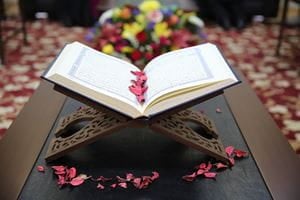
Pixabay.com
Wudu is performed five times a day shortly before salat. Like salat, wudu consists of a specific set of movements as different parts of the body are washed.
Before wudu is performed, the Muslim must make their intention by saying, “I am performing wudu for the pleasure of Allah and to seek closeness to him.” The Muslim then removes anything on the face and hands that might block water from reaching the skin. This includes not just rings, watches and gloves but also paint or mud that would act as a barrier.
To perform wudu, a Muslim first cleans their hands. They use clean water to rinse their hands. The right hand is cleaned before the left. Next, a Muslim cleans their mouth. This can be done with a toothbrush or simply with water. The nose is also cleaned. To do this, a Muslim holds a small handful of clean water to their face and lightly inhales the water just enough to pull some of the water into their nostrils.
Next, the Muslim takes a handful of clean water with their right hand and pours this over their face from their hairline. They use their right hand to rub the water down their face from hairline to chin. It is recommended that Muslims do this twice, but to do so three times or more is forbidden.
Muslims then wash their hands and arms. The left hand is used to pour water over the right hand from the elbow to the finger-tips. The left hand is then used to wipe the water over the arm to be sure that all the skin has been reached. This must be done from the top of the arm down or the wudu will be invalidated. This is then repeated with the right hand and left arm. Just like when washing the face, a second washing is recommended, but a third is prohibited.
When performing wudu it is important to insure that the water reaches the skin. If a person is particularly hairy, the water must penetrate the hair and reach the skin. This is also true when a person washes their head.
A Muslim who is performing wudu wipes their head after their face and arms. The Muslim takes the moisture that remains in their right hand from washing their arms and wipes the front quarter of their head. This is done by running the index, middle and ring fingers from the back of the head toward the forehead, but the hand must not touch the forehead. If the Muslim’s hand does touch their forehead, their wudu will be invalidated because they will be unable to properly wash their feet. Muslims performing wudu are to wash their feet only with the water from their hand. If their hand touches their forehead, the Muslim is using water from their forehead as well as their hand.
The ears are cleaned next. A Muslim uses their damp hands to wipe the back and insides of their ears. The feet are cleaned last. The Muslim wipes from the tip of their toes to their ankle joint. The right hand is used to wash the right foot, and the left hand is used to wash the left foot.
When performing wudu, a Muslim’s head and feet must be dry before they are washed. Otherwise, the Muslim is not washing their feet with just the moisture of their hands. Muslims are also prohibited from adding fresh water to their hands when they go to clean their feet. The water used is meant to be what is left from the rest of their wudu except in very special circumstances. Should the Muslim’s hands dry before they can finish wiping their feet, they are allowed to use the water from their eyebrows or beards to re-wet their hands.
As Islam developed in modern-day Saudi Arabia, clean water was not always readily available for performing wudu. In such cases, a Muslim could perform tayammum instead. Tayammum is a similar ritual purification. Instead of using water, however, a Muslim can use clean sand, soil or stone. Before turning to tayammum, a Muslim must first search for clean water. If they still cannot find any or the water source is guarded by a dangerous animal or enemy, the Muslim can perform tayammum. To perform tayammum, the Muslim says their intention as they would if they were performing . The intention for tayammum is “I am doing tayammum in place of wudu for the pleasure of Allah and to seek closeness to him.” The Muslim then strikes their palms simultaneously on the soil or sand. They then perform the same series of motions they would make if they were performing wudu.
Wudu lasts until a person becomes ritually impure which can be done through having sex, using the bathroom, passing gas or a number of other ways. As such, most Muslims perform wudu before every prayer, just to be safe. According to Islam, intentions matter a great deal before Allah, but most Muslims are willing to take a few minutes to ritually purify themselves just in case.

